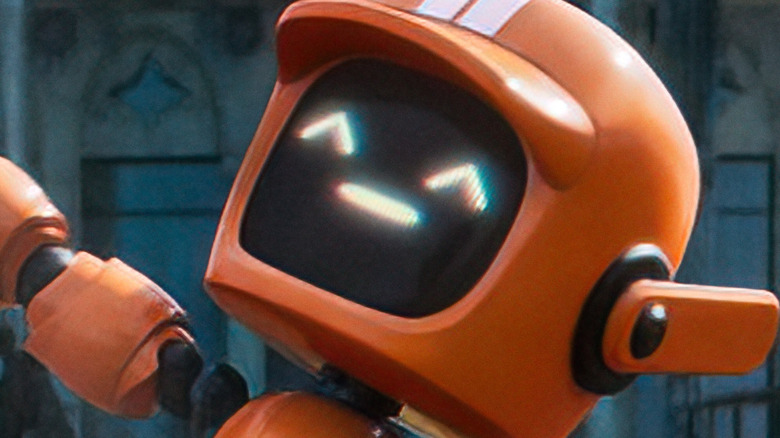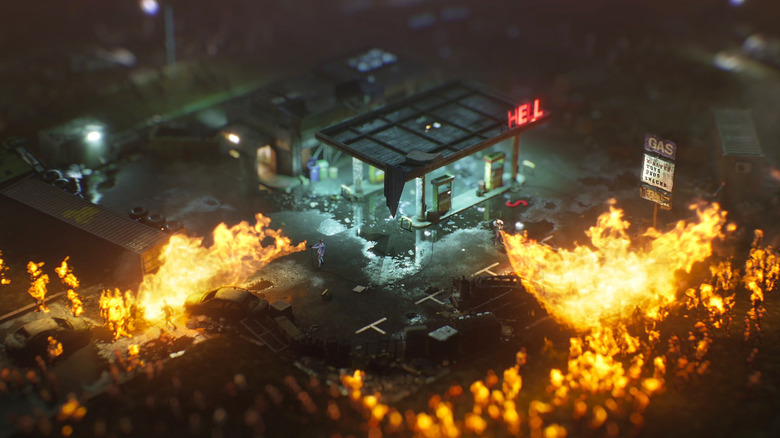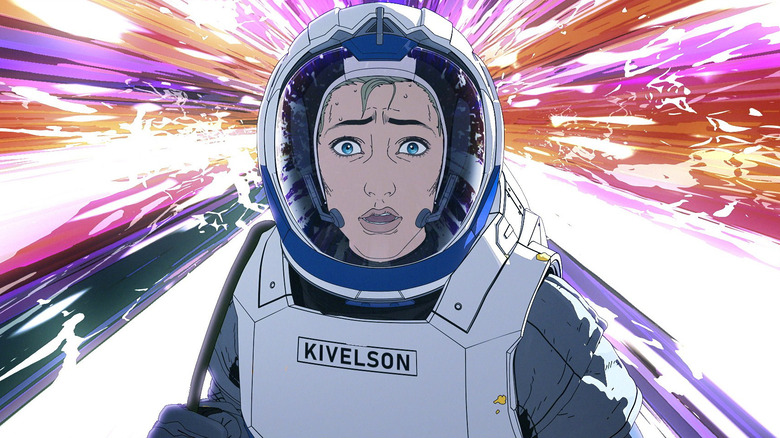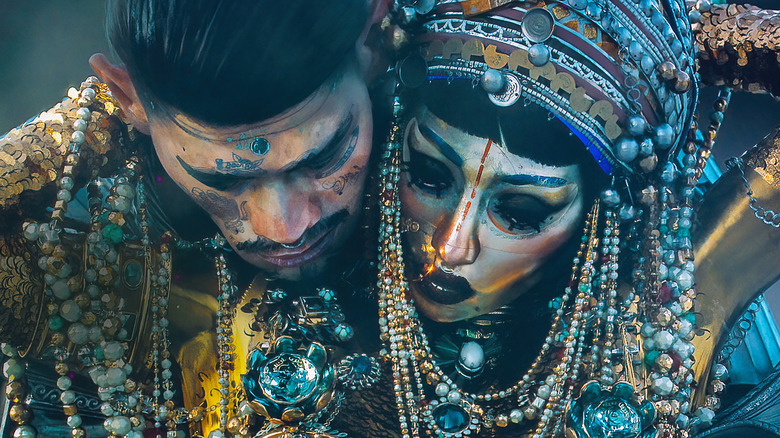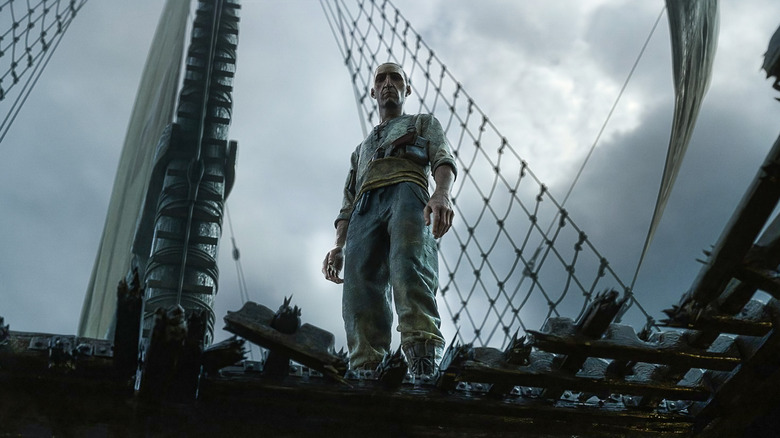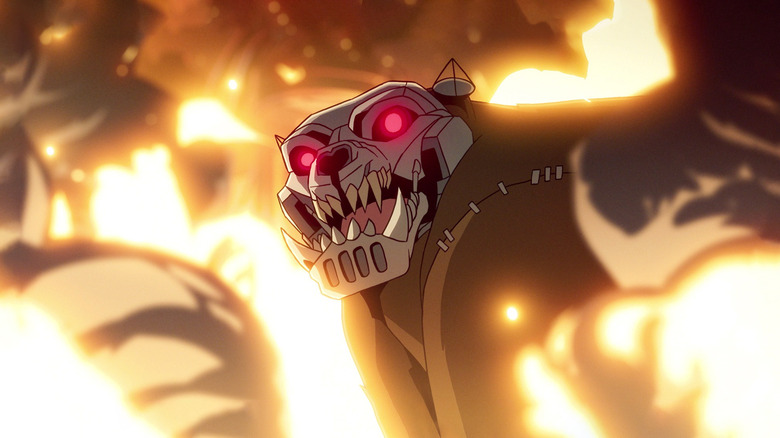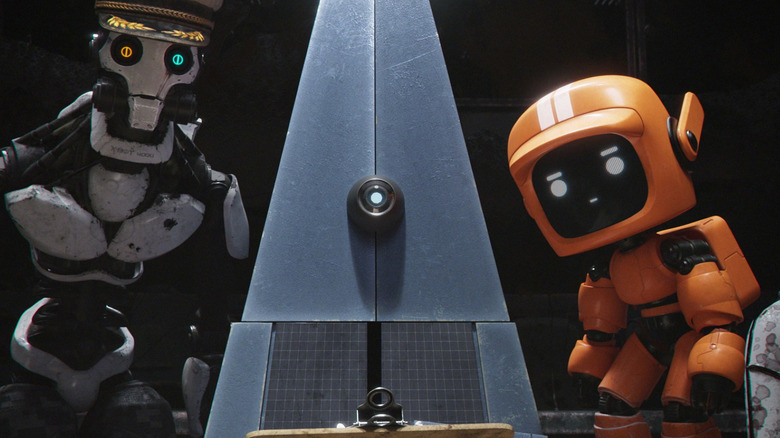Tim Miller & Jennifer Yuh Nelson On Love Death + Robots' 'Demented' Volume 3 - Exclusive Interview
"Love Death + Robots" is a show that feels almost too cool to actually exist, and we're lucky that it does. Built on the framework of an unproduced "Heavy Metal" reboot from David Fincher and "Deadpool" director Tim Miller, this adult animation science fiction anthology series gives incredible artists near-unrestricted freedom to make whatever twisted short films they want, most of them adapted from excellent short stories. The episodes vary wildly in styles and tones, and given the oft-extreme violence and sexual content, it is definitely not to all tastes. For those who are into this sort of thing, "Love Death + Robots" offers a lot to love — the first two "volumes" of "Love Death + Robots" have won a collective 11 Emmys.
"Love Death + Robots" Volume 3 is now available to stream on Netflix, and Looper got the chance to speak with co-creator/executive producer Tim Miller and supervising director Jennifer Yuh Nelson about the series. Topics discussed include finding the right balance between entertainment and ultraviolence, working with different writers and animation techniques, and what could be in store for the series in potential future seasons.
Has Love Death + Robots become even darker?
Netflix sent advance screeners for three episodes, but I actually got to see four episodes of Volume 3 at the early Alamo Drafthouse screening.
Tim Miller: Oh, you're lucky.
Is it just me, or does it feel like the series is even more apocalyptic than it was before? It's funny — Volume 2 had multiple stories about the cost of immortality, and now Volume 3 seems to be [about the fact that] everyone dies all the time.
Jennifer Yuh Nelson: There is a lot of death this time. I'm not quite sure how that happened.
Miller: There's a global pandemic, maybe you've heard.
Nelson: Perhaps reflecting the times.
Miller: There's a war in Ukraine ... We should have a little rating system for our volumes to see where they fall on the apocalypse meter and if we're tipping a scale. I don't feel like we consciously went darker, although David [Fincher's] is a big fat 20-minute ****er. And it's dark.
Nelson: That one went dark.
Miller: It's people being eaten by a giant crab. Pretty dark.
There's also many funny apocalypses as well. You had the zombie short, "Night of the Mini-Dead," and the return of the three robots in "Exit Strategies."
Nelson: Definitely. You have to leaven the darkness with some light, otherwise people shut down. The goal of this is to entertain people and have people have a little bit of enjoyment. and sometimes you go very dark.
Miller: Yeah, but a certain kind of people –
Nelson: Sure.
Miller: – in a certain kind of entertainment.
Nelson: See demented people.
Miller: There's plenty of places where they can see happy, happy stuff, but we do think that there's a lot of laughs in the mix. We don't want to bring people down too much. Even dark humor is welcome in the show.
Nelson: Yeah, I do love the zombie one.
Miller: Yeah, me too.
Nelson: That one made me smile.
Different shorts have different production schedules
What is the production schedule like for these episodes? Do some take longer than others? I noticed the press notes mentioned that "Exit Strategies" was being written at the same time as the first "Three Robots."
Nelson: I don't think it was written at the same time. Some definitely took longer than others. One of the episodes started at the beginning of production for Season 2, and one of them was started probably about six months ago.
Miller: "The Very Pulse of the Machine" was one of the first we started production on with Emily Dean. Honestly, we listened to the fans and we heard they wanted more when Volume 3 came out and we had these two that we'd really wanted to do. We shove them forward into production and they really turned out great.
"Night of the Mini Dead" was something we'd been working on, but we hadn't put in a production, as well as "Mason's Rats," which I'd loved. It was in the very first "Heavy Metal" anthology that we had put together, stories by Neil Asher.
Nelson: That reflects the different productions and different schedules and different artists, different studios. They all have different ways of working. Some of them are a lot faster because of the technique and some take a lot longer with fewer people. You could look at a schedule of two and a half years for a 15 minute short.
Did Jibaro go too far?
During the Drafthouse Q&A, Jennifer Yuh Nelson mentioned that while the show generally lets artists do whatever they want but there were a few times you feared Alberto Mielgo's "Jibaro" went too far, even for "Love Death + Robots." What had to be changed from that episode?
Nelson: I don't think much had to be changed in that episode. You should see what Alberto's original storyboard pass was. Almost shot for shot is pretty much what actually made it through to the final.
Miller: We all have a little internal meter where it goes from interesting to uncomfortable. A little discomfort is fine, but you don't want to put people out. You don't want to make people feel bad. You don't want them to walk away feeling disturbed, or at least I don't anyway.
Nelson: There was a few more shots of murder in the original pass, but if you don't see it, it actually feels worse. You don't see it, but it still feels pretty gruesome.
Miller: Everybody's got that line in a different place. In my story, there's lots of blood — I was going to give a spoiler away — but it's [that] kind of violence. If you're in a room full of people, as we are when we're making these stories, you can feel it when something maybe steps over the line.
Alberto is a very smart filmmaker and he's there to entertain, not put people out either. There's no real battle. We do try and guide the ship a little bit so we have this nice balance of story, humor, art and drama.
New writers on board
All but four episodes from the first two volumes were written by Philip Gelatt. He still has a few episodes this year, but the writing duties are much more split up amongst different writers. Every episode I screened so far has been from a different writer. How did this expanded group of writers come about?
Nelson: Phil's fantastic. At this time, we involved the original writers much more than before.
Miller: We did. I like to write my own if I can. We tried to spread it out. We love Phil. He's still there and still working on the show, but as schedules evolved, we did things a little differently. Occasionally.
Nelson: It's also nice to bring the character of the original writers in. Justin Coates' crazy dialogue for "Kill Team Kill" was such a part of the character that we wanted to make sure it carried through.
Miller: The stories almost always are very true to the original story. I feel like it's a little pact we make with the authors, but it also makes sense because we pick these stories because we like them and you can see already that they're going to work. We try and stay as true to them as possible because if it ain't broke, why fix it?
Cartoony vs. realistic animation
The animation styles in the show vary wildly from near photorealism to super stylized and everything in between. Personally, do you prefer working on the more realistic shorts or the more cartoony ones?
Nelson: It depends on the story because last season, I did a very photorealistic one ["Pop Squad"], stylized but pretty realistic. This season is not at all — it's a hand drawn, 2D episode ["Kill Team Kill"]. They're both completely joyful in totally different ways.
Miller: I like both too, I got to say.
Nelson: Would you do a 2D episode, though?
Miller: Totally. I did 2D animation in college. I love 2D. I wouldn't have — it's the story, you're right. I mean, it kind of is. There's a little bit — when it's mocap, in photoreal, you know what you're going for, to a degree.
The surprise of it all is a little less of a thing as you go through production, [unlike] something like "Mason's Rats," when you see this stylization that you didn't expect, or this character animation that you didn't expect because you weren't shooting it in mocap and you didn't see the dailies, it adds a little something to the process of these little daily surprises.
Nelson: Blood spatter looks really good in 2D.
Miller: Yes.
The future of adult animation on Netflix
There have been reports recently about Netflix making big cuts to its animation department. "Love Death + Robots" isn't made directly at Netflix Animation, so I don't know if you've felt any impacts from this, but from your perspective, what's the future of adult animation on streaming looking like?
Nelson: As long as there are people to watch something, that's going to be a better way for us to be able to make it. We got to have people say, "This is what we want to see and watch it," and then we'll have the opportunity to make things. There's change that's happening all the time. As far as "Love Death + Robots," we're trying to do whatever we want to do to make something cool.
Miller: I've always felt like being allowed to do the show is a gift. If people watch it, then someone will produce it. We go into every short with that attitude and every season with that attitude and hopefully, enough people will watch it and we'll keep making it because we both love it. We really do.
Are there any short stories you wanted to adapt this season, but couldn't get the rights to?
Nelson: Always, but not necessarily because of rights. There's too many stories. We have so many stories that would've been great, but we haven't had a chance to make them yet.
Miller: There is one, I'm not going to say its name, but I'm going to say Dan Simmons, you got my call, but you said, "No." If you're [reading] this, you know what I want, you know what we want. You know we will do a great job with it, so let us have it. Please.
"Love Death + Robots" Vol. 3 is now streaming on Netflix.
